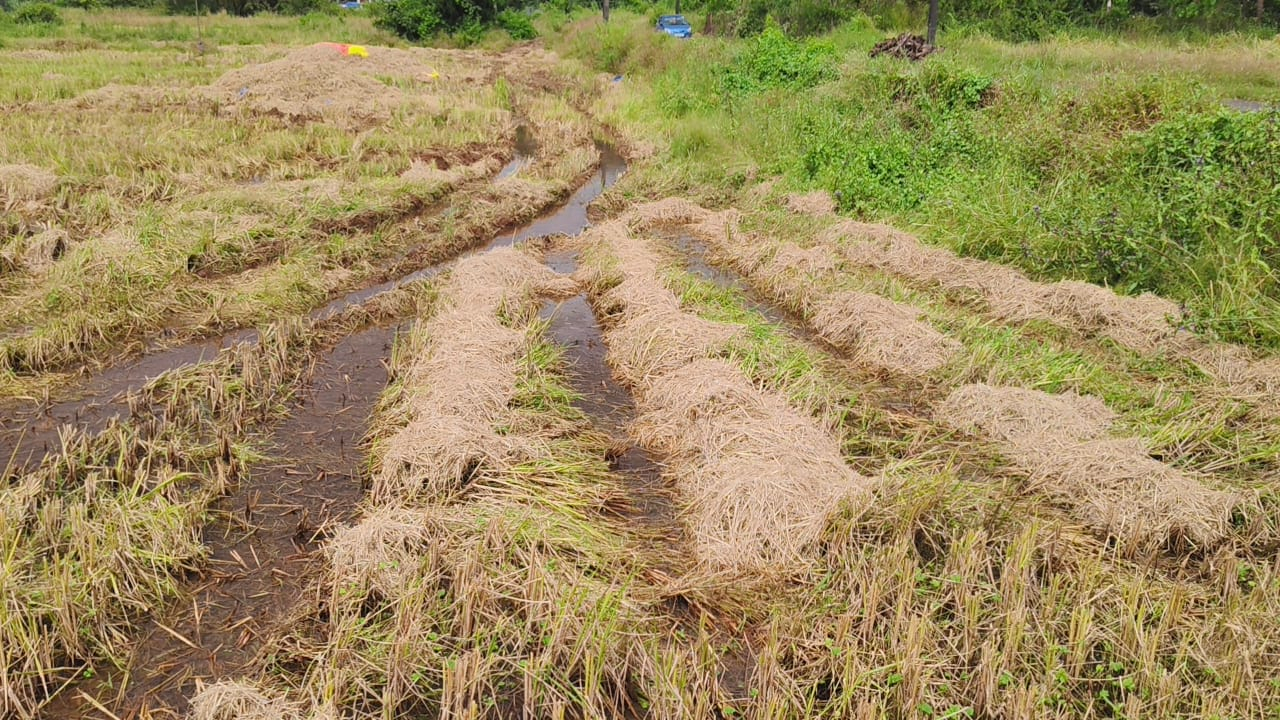
File photo of paddy crops flattened and damaged in Aldona following unseasonal rains.
MAPUSA
Standing by her flooded paddy field, tears well up in Magdalene Dias’ eyes as she looks over what was once a promising golden crop. Today, it lies submerged in muddy water, flattened and lifeless.
“We had put all our efforts into cultivating our fields, and this time we had really got a good crop. But the sudden unseasonal rains just at the time of harvesting have washed away all our dreams. All our hard work has gone down the drain,” she said, her voice heavy with emotion.
Dias, a farmer from Saligao, is among several cultivators in Bardez whose hopes have been shattered by the untimely downpour that lashed Goa in October. What was to be a season of harvest and celebration has instead turned into one of despair and loss.
Ruins after rains
Across the Bardez taluka – from Aldona and Moira to Siolim and Anjuna – the sight is the same: paddy fields waterlogged, golden ears of rice bent to the ground and farmers staring helplessly at their ruined produce.
Vishnu Haldankar, a farmer from Quitula-Aldona, shares a similar fate. “Almost all my crops have perished due to the sudden rains,” he lamented.
For the Haldankars, farming is a family affair. Vishnu, his wife, brother and sister-in-law work together on their fields, nurturing their crop from sowing to harvest.
“We worked hard for three to four months, and the crop was excellent this time. But just when it was time to harvest, the rains came and destroyed everything. It has cast a shadow over all our efforts,” Haldankar said.
He had heard that the government would compensate affected farmers, but said he had yet to receive any official forms to apply for aid.
‘Everything went underwater’
Another farmer, Babani Redkar from Aldona, had cultivated four fields this season. “I managed to harvest one of the fields when suddenly it started pouring,” he recounted. “The other three are still underwater. The paddy corns have fallen into the water and will either germinate or rot,” he added.
For Redkar, like many others, this means not just the loss of a season’s work, but also financial strain. Many small farmers depend solely on their paddy yield for income and household sustenance.
Nature’s fury, farmer’s pain
The late-October showers came as a cruel twist in an otherwise favourable season. With the monsoon having arrived early and spread evenly this year, many farmers had been looking forward to a bumper crop.
The timing of the rains – just days before harvest – proved disastrous.
Most fields are now inundated. Even where the water has begun to recede, the fallen stalks have little chance of recovery.
Agricultural experts say that once the mature paddy falls into water, it begins to sprout prematurely, making it unfit for milling or consumption.
‘We will not cultivate again’
Nelson Figueiredo, former director of agriculture and himself a practising farmer, sympathised with the plight of the farming community.
“For a toiling farmer, when a tragedy like this strikes right at harvest time, it’s most frustrating. After investing so much money, hard work and hope, the sudden loss is very discouraging,” Figueiredo said.
He admitted that the recurring cycle of investment and loss has disheartened many cultivators. “Many farmers who suffer like this simply give up and say, ‘We will not cultivate again.’”
The cost of farming
Figueiredo pointed out that the government’s compensation schemes often fall short of addressing the real costs of cultivation. “The actual cost to cultivate one hectare of paddy is nothing less than Rs 70,000 to Rs 1 lakh. The government’s proposed compensation of Rs 40,000 per hectare doesn’t even cover half of that,” he explained.
He stressed that while government assistance is welcome, it cannot make up for the loss of labour, time and emotional investment that farming demands.
A cry for support
The unseasonal rains have once again highlighted the fragile nature of traditional agriculture in Goa, where small and medium farmers depend heavily on weather patterns that have grown increasingly erratic.
Many farmers in Bardez now find themselves not only counting their losses but also questioning the future of farming itself. For Goa’s farmers, the rains that once signified life and prosperity have this time left behind only heartbreak and uncertainty.